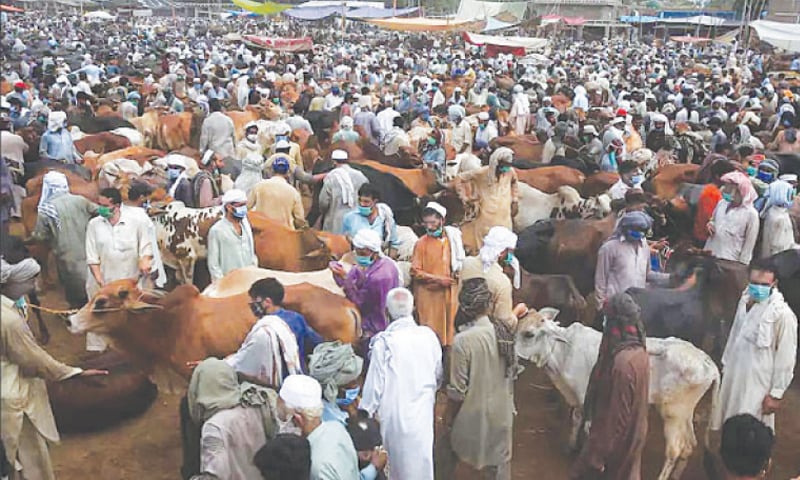Paying little heed to the government’s advice of restraint, as the potentially devastating fourth wave of Covid-19 threatens Pakistan, people celebrated Eidul Azha with traditional fervour as activity-starved youth were seen moving in groups visiting cattle mandis.
The multi-billion rupees Eid market that shrunk to half in 2020 covered much of the lost ground this year. Spike in activity was also observed in Eid related shopping in clothing, footwear and accessories segments with women and children thronging malls and bazaars. Fearing a spike in Covid cases other provinces are watching closely but Sindh Government has imposed stiff restrictions from today as health infrastructure started creaking with patients load.
Last year economic slump and the lockdown curbed Eid related businesses. Improved economic conditions, social distancing fatigue and the religiosity triggered by pandemic fears converged to mobilise people at the holy festival. In the absence of firmed up data, it is hard to project the actual size of the Eidul Azha economy but careful estimates put it in the vicinity of Rs175 billion up from Rs100bn in 2020.
More dependable indicators such as the volume and value of hides procured by tanneries, spike in remittances, cash withdrawal from banks, the volume of online business and digitised money transfers will emerge later but early estimations point to a volume way bigger than before. “There is consensus that total Eid business has surged in 2021,” Asif Javed, a seasonal investor who partake in cattle business with a close group of friends’ told Dawn. His group caters to a dedicated circle of elite clients in Lahore. He expects to double the invested capital in a short two months investment cycle this year.
In the absence of firmed up data on the money trail, it is hard to project the actual size of the Eidul Azha economy but careful estimates put it in the vicinity of Rs175 billion up from Rs100bn in 2020
A source close to the Pakistan Tanners Association said 6.5 to 7 million animals are sacrificed this year with the share of cows almost equal to goats for the first time. Suppliers gauged the trend and increased the supply of cows. Prices of big animals increased moderately by 5-10 per cent but goats were pricier by 25-30pc this year, he said.
Some people find projections of the Eid economy exaggerated but there are dependable indicators that point to a size actually much bigger than Dawn’s projections. According to a dependable source last year the contractor in Malir Karachi managing the main cattle mandi raked in Rs890m from registration fee and stall rents. If a facilitator in one city in a dismal year made this much one can imagine the total size of this side business across Pakistan each year.
The composition of cattle business seems to be changing with buyers’ preference for cows. “It all comes down to costing in the end. The cost of goats and sheep escalated more sharply than bigger animals. The related cost of butchers has risen to a point where even the middle class feels the pinch. A normal goat was priced around Rs45-50,000 in Karachi this year when you get a bachia (small cow) for Rs80 to 90,000. For joint families a cow makes more sense,” said a businessman whose goats were stolen a day before Eid.
An informal telephonic survey to garner the feel of Eid in different cities did not project a uniform sense. Some respondents thought it was too quiet this year. “The delusion of calm before Eid was created by the ban on the sale of animals in downtowns. In reality, the hustle-bustle in cattle markets, functional around the clock in the periphery of cities (such as in Lahore and Karachi), was remarkable. Besides, many people placed their animals in safe houses because of rainy weather and safety concerns,” commented a keen observer.
Experts believe that the pandemic has left a profound impact on society. “Remote qurbani is safe, sensible and economical. It makes so much more sense to transfer funds digitally to source areas up north and distribute meat amongst the neglected lot there instead of paying for transport and upkeep in urban centres. People who were forced towards digitised options last year may now be opting them voluntarily,” said Abid involved in ‘Waqf’ management. In ‘sharing system’ also promoted by philanthropic entities, the shareholder can get his share of meat whereas under ‘Waqf’ the shareholder foregoes his share and let the meat be distributed on his behalf by operators.
The surge in demand for sacrificial animals in cities drove the prices up despite a comparatively steady supply situation compared to last year. The dealers justify the rise because of higher rearing, transport and camping costs.
Rural Pakistan is expected to reap rich dividends this year. There is a net transfer of wealth from rural to urban in Eidul Fitr but the trend reverses in Eidul Azha because of the composition of spending. The rural population wins naturally in the cattle trade. They market collectively about one-tenth of the cow and goat population every year at the Muslim festival of sacrifice. The share of the livestock sector that promise high returns has persistently been rising in the rural economy.
The leather industry is hoping to do better this year after the difficult last year. “More than half of skins and hides are wasted every year in Pakistan. This year we leveraged social media to educate public on a simple ways to save the precious resource. We are hoping to curb the level of wastage and procure hides worth Rs18-20bn,” said Syed Shujaat Ali, a leading leather garment exporter.
Published in Dawn, The Business and Finance Weekly, July 26th, 2021













































